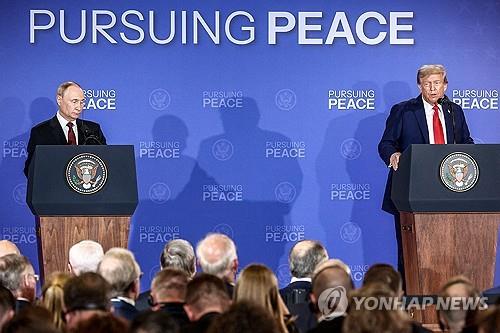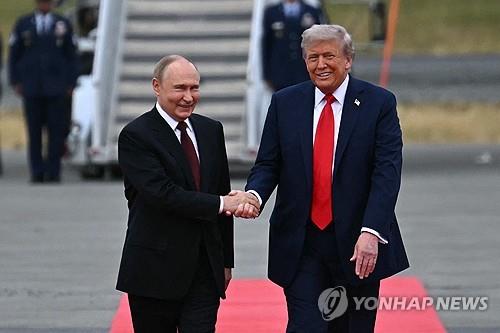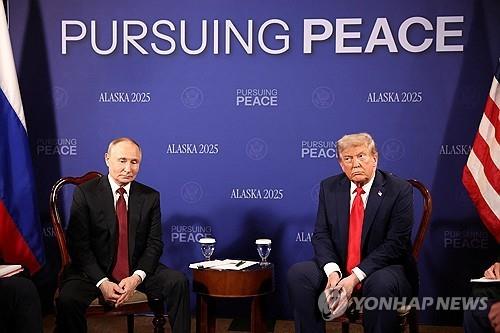
(Washington = Yonhap News) Correspondents Jo Jun-hyung, Park Seong-min, and Kim Dong-hyun = As the 'Alaska Summit' between U.S. President Donald Trump and Russian President Vladimir Putin ended without a deal on the 15th (local time), the search for an exit from the Ukraine War that has been going on for three and a half years is being delayed for the time being.
At a joint press conference following the meeting that day, the two leaders gave positive evaluations, using expressions such as"productive" (Trump) and "constructive" (Putin), but failed to come up with an agreement on a ceasefire, a cessation of hostilities that would be the first step toward ending the Ukrainian war.
At this meeting, there was no mention of a"ceasefire," which was expected to be finally agreed upon through follow-up trilateral or multilateral talks involving Russia, Ukraine, and the United States if the two countries agreed to it.
First, President Trump left room for follow-up negotiations, saying in a press conference,"We haven't reached an agreement, but there's a very good chance we'll reach an agreement."
He said,"I will call NATO later. I will call several people I think are appropriate, and I will call President Zelensky (Ukraine) first and tell him about today's meeting," indicating that he will begin to gather opinions from the opposing camp in Russia based on the results of the meeting that day.
If Ukraine and the European countries that have supported Ukraine evaluate the Russian ceasefire proposal conveyed by President Trump as"forward-looking," the possibility of subsequent negotiations that include Ukraine could increase.
However, as the two leaders failed to come up with any tangible agreement during the rare opportunity of a face-to-face meeting, some are cautiously optimistic about the prospects for future negotiations.

The failure to reach a visible agreement appears to be due to the failure to find common ground on issues such as 'territorial redistricting' and providing security guarantees to Ukraine, which are core to discussions on a ceasefire or end of the war.
Russia is likely to have expressed reluctance to accept security measures such as the stationing of Western troops in Ukraine, while maintaining its position of incorporating the occupied territories in eastern Ukraine, including Donbas, into its own territory.
Even before the meeting, President Trump had been raising the issue of territorial redistricting surrounding Russian-occupied areas in Ukraine as a subject of negotiation, and had made it clear that Ukraine's membership in the North Atlantic Treaty Organization (NATO) was"unacceptable."
Ultimately, it can be seen that President Trump's starting point for negotiations was to largely accept Russia's demands, but it is believed that he failed to extract any"concessions" from President Putin that Ukraine and Europe could consider accepting.
It is also unclear how strongly President Trump will use the sanctions card against Russia to extract"concessions."
Given that both leaders have positively evaluated the summit, if we take this at face value, it seems impossible to completely rule out the possibility that some progress will be made through follow-up negotiations in the near future.
However, if Russia's offensive against Ukraine continues without any significant progress on the ceasefire, this summit could ultimately be evaluated as a 'questionable victory' for President Putin.
President Putin, who has been severely isolated from the international community since the full-scale invasion of Ukraine in February 2022, met with the leaders of major Western powers for the first time since the outbreak of the Ukrainian War, and set foot on American soil for the first time in 2015. With an arrest warrant issued against him by the International Criminal Court (ICC), this summit could be seen as an opportunity to partially escape his diplomatic isolation.
There is also an aspect of accumulating a certain legitimacy in that it even showed an attitude of responding to dialogue to end the war.
President Trump, aiming for the Nobel Peace Prize, has now faced a wall called Putin in his diplomatic efforts to mediate international disputes.
Since returning to the White House in January, he has made a name for himself by mediating conflicts or disputes between Cambodia and Thailand, India and Pakistan, Rwanda and the Democratic Republic of Congo, and Azerbaijan and Armenia, but has hit a wall in the most crucial war in Ukraine.
The key to follow-up negotiations will likely be whether President Trump will use the sanctions card against Russia he has in his hand.
On the 6th, President Trump signed an executive order imposing an additional 25% tariff on India (to be implemented around the 27th) due to its imports of Russian oil, thereby pulling out the so-called 'second tariff' card.
There was an aspect of imposing sanctions in the form of increased tariffs on countries trading with Russia, while also squeezing Russia's financial resources.
In addition, President Trump has additional pressure cards in his pocket, including sanctions on Russian banks and additional tariffs on China, another major customer for Russian energy.
Taking concrete steps to implement these sanctions while pursuing follow-up negotiations with Russia would increase the likelihood of mobilizing Russia.
However, the general opinion is that if President Putin hesitates to take action out of concern about the repercussions on the US-Russia relationship that began to normalize through this meeting, it is unlikely that he will try to stop the war on his own, which is currently going in his favor.
In this regard, it seems unusual that President Trump did not mention any comments or sanctions that could be interpreted as “pressure” on President Putin during the press conference that day.
Also, in an interview with Fox News before his return to Washington, Trump was asked about the"consequences" of his warnings to Russia, including the possibility of raising tariffs on China over Russian energy imports, saying,"Because of what happened today (the US-Russia summit), I don't think we need to think about that right now."
He then reiterated,"I may have to think about it in two or three weeks, but I don't need to think about it now."
President Trump then revealed his perception that the ball was in Ukraine's court, saying that whether or not an agreement could be reached was up to Ukrainian President Zelensky.
It seemed that there was room for interpretation that they were trying to extend the time for 'diplomacy' rather than immediately implementing pressure measures such as sanctions against Russia.
In this situation, there are concerns that if President Trump does not pursue both “pressure” and “negotiation” in tandem with President Putin, who believes that the “race against time” is not currently disadvantageous, he could easily become caught up in Putin’s delaying tactics.
In the end, the international community's attention is expected to be focused on whether President Trump, who shook hands with President Putin for the first time in six years and even offered to sit next to him in the limousine on the way to the summit, will be able to change his expression and begin to put pressure on Russia.


